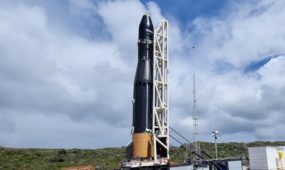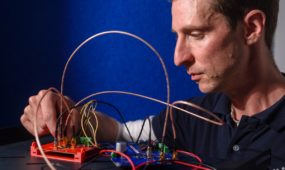New frontiers for South Australian space industry
Space
The International Astronautical Congress hit Adelaide in 2017, bringing more than 4500 space experts to town and the focus of the world on South Australia.

Sign up to receive notifications about new stories in this category.
Thank you for subscribing to story notifications.
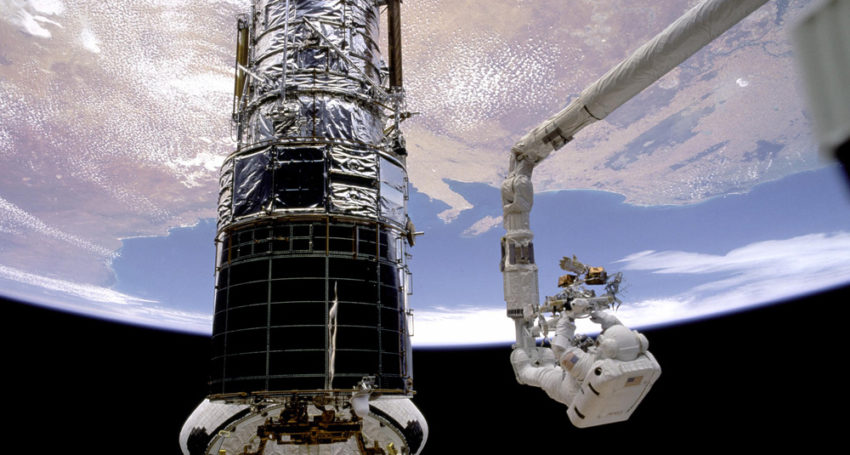
Story Timeline
Space Industry
Although the IAC was the culmination of a decade of work by many people in Australia’s space industry, it can also be seen as the launching pad for a revitalised space industry based in South Australia.
The Australian government used the congress to announce that Australia would finally have a national Space Agency (pending yet another review due in March 2018) while Elon Musk used the congress to tell the world he was putting all his resources toward developing his BFR to not only travel to Mars but also to reduce earth travel times to under an hour and establish a lunar base.
Michael Davis, the Chair of the Space Industry Association of Australia, said organising the congress made South Australia a leader in space industries and the South Australian government’s space plan would help the state influence the new National Space Agency.
“The South Australian government backed our bid [for the congress] right from the beginning, going back eight years,” he said.
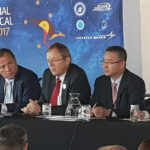
Heads of space agencies, from left, NASA Acting Administrator Robert Lightfoot, Russian Federal Space Agency (Roscosmos) Head Igor Komarov, European Space Agency Director General Jan Woerner, China National Space Administration (CNSA) Secretary General Tian Yulong and Japan Aerospace Exploration Agency (JAXA) President Naoki Okumura at the International Astronautical Congress in South Australia.
“When we won the bid, they saw the opportunity. They didn’t wait till the congress took place, they formulated and implemented a strategy that has led directly to the announcement of the South Australian Space Industry Centre and the $4 million in funding.”
A week before the National Space Agency announcement, South Australia’s Minister for Defence and Space Industries Martin Hamilton-Smith pledged $4 million over four years to boost the space industry in South Australia.
Hamilton-Smith also opened the South Australian Space Industry Centre to drive space industry innovation, research and entrepreneurial development.
During the congress South Australia further strengthened its leadership by partnering with the ACT and the Northern Territory to jointly develop Australia’s space sector.
Having the IAC in Adelaide gave South Australian space companies the opportunity to engage directly with global players.
Included in those opportunities was micro-satellite company Inovor signing a deal with Italy’s largest space company SITAEL to set up the company’s Australian office in Adelaide.
Fleet, the South Australian company looking to connect the IoT with small satellites, had the French space agency CNES agree to track the company’s satellites once launched, while Nova Systems announced that former Space Shuttle commander Pamela Melroy would move to Adelaide to work with the space company.
There are at least 60 South Australian organisations with space-related expertise and 11 local space startups, including Myriota, Fleet Space Technologies, Inovor Technologies and Neumann Space.
The space industry is no longer restricted to being the exclusive domain for astronauts and rocket scientists, but is proving to be an open door for a variety of occupations, from lawyers, economists, and IT professionals to public relations officers and sales consultants, according to Annalisa Piva, who wrote a report for Defence SA in August on the economic benefits of a space agency.
The state government also began a partnership with the German Aerospace Centre (DLR) and pledged to expand support of the University of South Australia’s South Hemisphere Space Studies Program.
In October the South Australian Space Industry Centre issued a global call for organisations to run its Space Incubator and Space Accelerator programs.
The programs, backed by a $1 million a year space innovation fund, have been established to support space startups and grow early stage businesses.
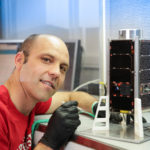
Dr Matthew Tetlow at the University of Adelaide with a CubeSat that was launched by NASA earlier this year.
While South Australia’s history of being the home of the Woomera test range is often cited as a core strength for the expanding $4 billion industry in Australia, the real strength of South Australia is the state being home to many of the major defence primes.
According to a December 2017 report by Defence SA, “some of the world’s leading space companies, such as the British BAE Systems, our Speedcast, the American Lockheed Martin and Northrop Grumman, and the German Airbus Defence & Space are located in South Australia.”
As with the renewable energy industry in South Australia, Elon Musk made headlines in Adelaide when he outlined his new BFR plans to a packed house in the Adelaide Convention Centre.
Musk set a timeframe of 2022, telling the thousands of space experts gathered at the IAC in South Australia that it was “not a typo”, with a follow up mission of four spaceships by 2024.
“Five years seems like a long time to me,” Musk said … setting a frantic pace for the rest of the world.
Jump to next article
